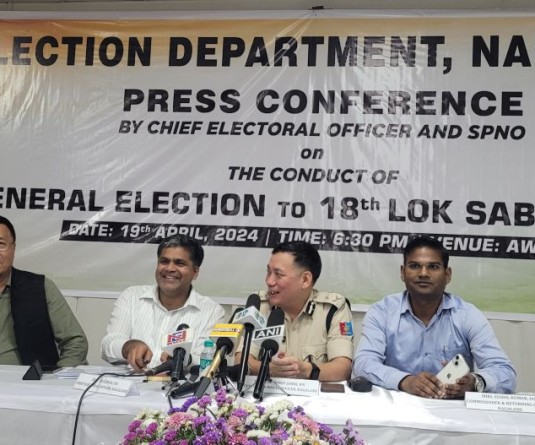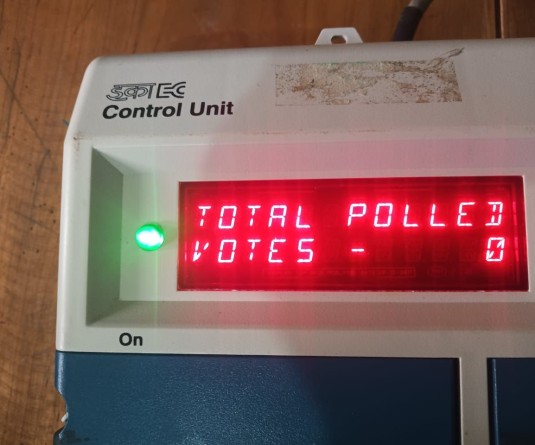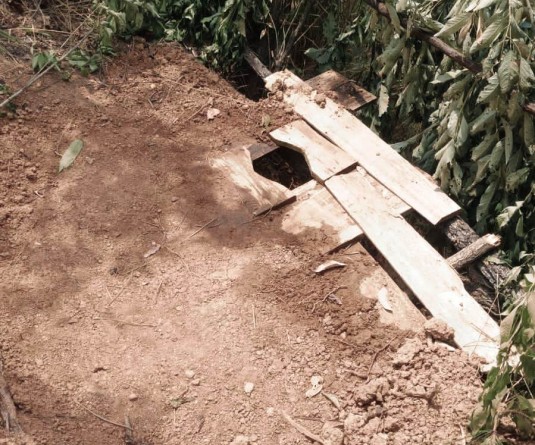
Our Correspondent
Kohima | April 18
As part of 75th anniversary of Battle of Kohima (World War II) under the theme “Remembrance, Reconciliation, Rebirth,” a programme for ‘Restoring gallantry award medals to descendants of Naga veterans’ took place at Hotel Vivor under the auspices of Kohima Educational Trust (KET) and Kohima Educational Society (KES) on April 18.
Nagaland’s Chief Secretary Temjen Toy and Bob Cook, Curator, Kohima Museum, York, UK handed over medals and certificates to 43 descendants of Naga veterans at the function in the presence of guests from UK, some descendants of British veterans of the Battle of Kohima and the Burma Campaign.
The categories of gallantry awards won by the Naga veterans were: Order of the British Empire, Member of the British Empire, British Empire Medal, Imperial Service Medal, Military Cross, Military Medal, Mention in Despatches, Indian Distinguished Services Medal and the Indian Police Medal.
“We are gathered here today because of the war, specifically the battle of Kohima, the battle which was not ours, but the battle which was fought in our land and that has brought changed in the history of Nagas forever and the world as well,” said Temjen Toy.
In view of this, Temjen said the state government has decided to make the 75th anniversary a yearlong commemoration by organizing a number activities as a remembrance for those who took part, lost their lives during the war and to make it a platform for reconciliation and to look for a bright future.
He paid tributes to those involved in the fierce battle and suffered immensely during the war.
He welcomed guests who came from UK to be a part of the commemoration. He also thanked the KET and KES on behalf of the state government for organizing the function in a befitting manner.
Highlighting on the history of the medals, KES president Charles Chasie said the history of discovering the Naga gallantry award winners and recovery of the documents and medals had been a long and interesting journey.
“It even started without any proper focus on it. In 2014, during the observation of the 70th anniversary of the Battle of Kohima, the seed was planted to record the experiences of the Naga veterans who were still alive. In last part of 2015, research for a book and documentary film on the Naga experience of the 2nd World War began,” said Chasie.
After series of interviews of Naga veterans and elders still alive and who saw the war at close quarters, it became awfully clear how little material there actually was to authenticate case stories with official documents, he said adding, “Of the Naga veterans still alive then, we could not trace any official documents of awards. Several showed us their medals and we had their army serial numbers and documents but we could not confirm with official documents in British archives or other official establishments.”
Most had also lost their medals and documents in the intervening years. He said as the Naga contribution to the war was an important part of the book, research in this area followed, particularly, and more successfully, his co-author Major Harry Fecitt, knew where to look for them.
Records from the London Gazette, the national Archives and others began to slowly tumble out, he said adding that one helpful source was the personal diary of Eric TD Lambert, a policeman and intelligence chief in Kohima area who also served as temporary DC of Kohima during the siege of Kohima when CR Pawsey was holed up in his bunker unable to leave.
He said Robert Cook and Lambert's niece, Laragh Neelin also greatly assisted them.
“In recent days, the records unearthed by the Royal Commonwealth Ex Services League (RCEL) have also been helpful. Finally, what we got together was 69 Gallantry Awards won by Naga soldiers during the 2nd world war,” he said.
We hope to uncover more in the future and also to identify more of the Nagas who had won the Gallantry awards, he said.
In 2017, Secretary General of the RCEL, Christopher Warren personally came to Nagaland and met some of the surviving Naga veterans in Dimapur and in and around Kohima.
RCEL arranged some cash relief for the surviving Naga veterans and their widows and asked the KES to help give to them personally, he said adding, “This we have been doing a few times now and each time it has been a very moving experience to see the veterans receiving these gifts with so much gratitude, often breaking down completely as many of them are living in penury not even able to pay for their healthcare and other needs.”
The RCEL was to play an even more significant role in this journey that has led at to this day.
Robert Cook carried these medals to Kohima on two separate occasions.
“We in the KET/KES have been very keen to return these medals to the descendants of the Naga veterans because we have realized how much a part of Naga family history, and therefore Naga history, the 2nd world war had become,” he said.
He said a little mix-up appears to have happened in the categories of the Order of the British Empire and the Member of the British Empire medals.
“We will try our best to rectify this at the earliest opportunity…We hope you will bear with at for these shortcomings,” he said.
“The British veterans remember their Naga counterparts with gratitude, honoring them with what they uphold as that of a “Debt of Honour,” said KES chairman Dr P Ngully.
“This year, as we observe the year long 75th anniversary of the Battle of Kohima, it is most appropriate to acknowledge and remember those who gave their best for our today.
Many of them are not with us anymore but their legends live on to inspire and shape our society. They deserve our utmost recognition for their umpteen services rendered for our people during their times. We indeed remain grateful to them and to their descendants who are with us at this moment,” said Dr Ngully.
He said that the least that we can do is to restore the gallantry award bestowed upon them for the exceptional endeavors in line of their duties, adding that it is they who have laid the foundation of the theme “Remembrance, Reconciliation, Rebirth.”





